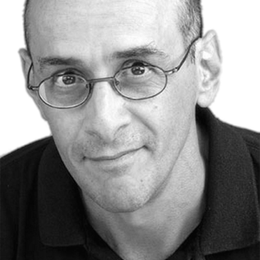Atrial Fibrillation: A Love Story
As troubling symptoms persisted, I debated what to do and when to tell my wife. Once I knew how to proceed, I was at peace.
In the fall of 2020, I was playing tennis with my pal Vini, just volleying casually without keeping score. Now and then, he would belt a shot well beyond my reach, and I would sprint after it. Only on this day, after three or four such tries in a row, I was gasping harder than usual.
"Let's take a break," I told Vini.

Perhaps, at age 68, I had let myself get slightly out of shape and just needed to whip myself together.
Feeling winded in the middle of our hour-long sessions had never forced me to take a break. I had trained my whole adult life as a recreational athlete to keep going without letup, even if exhausted from my exertions, and was conditioned to catch my breath eventually. But this experience was different from anything I had ever known before.
So began the most significant health scare of my life. But I mentioned nothing about it to Elvira, my wife of 41 years.
I thought little of the incident at the time. Maybe, I reasoned, my stamina that day happened to be down a few quarts. Perhaps, at age 68, I had let myself get slightly out of shape and just needed to whip myself together. Then again, maybe, just maybe – though I never acknowledged it to myself – I had some kind of an issue with my heart.
A Persistent Problem
Over the next few months, the problem persisted. In early 2021, I went for a jog around our neighborhood. Toward the end, I ran up an extremely steep hill, easily 100 yards long. I reached the top, panting loudly but also dizzy. I never got dizzy for any reason. I chalked the episode up as a fluke.
But then, a week later, it happened again, only worse. I ran up another hill, almost as steep, and had to stop in my tracks before getting to the top. I was dizzier than the previous time, so much so that for a second, I felt tempted to reach out to a parking meter to brace myself in case I blacked out and toppled over.
Clearly, something was wrong. But again, I set aside these inconvenient worries. I was just getting older. Stuff tended to happen. Maybe I would deal with it later. Again, nary a word to Elvira.
Then again, maybe, just maybe – though I never acknowledged it to myself – I had some kind of an issue with my heart.
Then came my final warning sign. I got into a three-on-three, half-court basketball game on a schoolyard playground nearby. About 20 minutes in, my lungs billowing away, I ran out of energy and grew dizzy. And, right then and there, in the middle of this competition, I stopped playing. Cold. I'd played hoops for 61 years, but this was a first for me.
I should have quit the game on the spot. But pride – and the forces of denial and delusion – prevailed. So, I resumed playing. Indeed, I rationalized, I could finish the game before I keeled over dead. Still, I now knew, with a dawning sense of certainty, that I should see a doctor sooner rather than later.
Once more, I said nothing about any of this to Elvira. What if these symptoms turned out to be nothing serious? Why concern her unnecessarily? Whenever she asked me how I was doing, I would tell her I was doing okay.
Facing Serious Obstacles
Besides, we faced another equally serious obstacle. Elvira was living in Italy while I lived in New York City, and I planned to move there as soon as possible. The coronavirus pandemic was hurtling along at full tilt, Italy its original epicenter, New York City its second. Elvira already had her hands full, keeping our family – our son and daughter, granddaughter and son-in-law – safe from the virus.
Hospitals worldwide were overrun with dying patients. Patients were delaying and canceling elective procedures and screenings left and right. How could I seek medical attention now? So, I opted, at least for the moment, to forgo a visit to my primary care doctor.
Meanwhile, I at least had the common sense to stop exerting myself as much. I avoided any activity that might leave me breathless and dizzy. I could have researched my symptoms online but decided against it. Whatever I learned would be less than definitive, mere diagnostic guesswork. Besides, did I want to know?
No. Not really.
A few weeks later, I came to my senses. I saw my physician and told him about my concerns. He referred me to my cardiologist, who subjected me to an electrocardiogram and detected an abnormal rhythm in my heart. He told me he needed to investigate further and strapped an electrocardiogram to my arm, connected to electrodes pasted across my chest, so that he could monitor my heart activity for 24 hours and evaluate the results.
Dealing With My Heart Issue
The upshot was that I was suffering from atrial flutter, a cousin to atrial fibrillation, though less severe. My heart was beating arrhythmically, one minute fast, the next slowly, due to a defect in electrical conduction. It was unlikely to pose any immediate danger, but it was hardly nothing. Long-term, it represented a clear-cut threat. At some point, it could trigger a heart attack or stroke.
I was advised to undergo a procedure called catheter ablation. It would be minimally invasive, involving a small incision in my groin that would enable a wire to be threaded through to my heart to correct the arrhythmia. I was told the procedure was effective 95% of the time and was scheduled for surgery at Mount Sinai Hospital in New York City.
Again, I told Elvira about none of this – nothing about my breathlessness or my dizziness, nothing about seeing a cardiologist, nor his diagnosis and my upcoming procedure. I had good reason to hold off, I felt. I wanted to get all the facts nailed down first and leave nothing open to surmisal or speculation. As I've learned, sometimes, in marriage, we have to keep secrets and tell lies for the good of both parties. This happened to be one of those times.
I could die. I could suffer a stroke or sudden cardiac arrest on the operating table. And what then?
But now, in a video call, I told Elvira. And she took it, as she takes most news, more or less in stride. She accepted my reassurances that I would be okay at face value, just as I expected she would.
"I can come back to New York to be with you," Elvira said.
This was no small offer. Elvira hated to fly in airplanes. She dreaded every flight and stayed nervous from takeoff to landing. Flying to New York City to be with me also meant she would be leaving behind our daughter, granddaughter and son-in-law, all still quarantined in the strictest of lockdowns. Offering to fly across the Atlantic Ocean during a once-in-a-generation pandemic to be at my side touched me as profoundly as when she accepted my marriage proposal.
"No," I said. "No need."
The date for my surgery loomed large, and I tried my utmost to maintain a modicum of equanimity. These were reputable physicians at a world-class institution. The procedure was well-established as the gold standard. I was in otherwise excellent physical condition. What could possibly go wrong?
But, of course, anything could. The procedure could go awry. It had happened. I was scared. I could die. I could suffer a stroke or sudden cardiac arrest on the operating table. And what then?
Reflecting on Our Life Together
I contemplated my mortality more gravely than I ever had done before. Everything would end for me. And why now? Round and round my head, this question went. Here I was on the cusp of starting a new life in Italy, reuniting with my family, only to be cut short. I would be gone, never to live in our new house, never again to be a husband, a father, a grandfather, much less a friend, colleague or neighbor.
With this new understanding of my life, a peace came over me, a peace such as I had never felt before, a peace that I now knew would see me through.
But I never said so to Elvira in any of our video calls. I was here and she was over there. Why complicate our complications? Instead, I told her I would leave the hospital all right. Again, I kept my secrets and told my lies. Specific stuff is, for the moment, best left unsaid.
But as I agonized, I reflected on my life, the whole of it. And I recognized, with a brilliant new and transcendent clarity, that I had led a good and more fulfilling life than I could ever have imagined or expected.
Elvira and I had lived together since 1977 with no lapse in love, fidelity or faith in each other. We had raised a son and a daughter, both now decent, humane, intelligent, funny and beautiful adults. We had our miraculous granddaughter, Lucia Antonia. I had arrived at age 68 in otherwise above-average health. Even my career had proven to be a moderate success.
I'd led a lucky life, luckier than most. If I died now, I'd have no right – none whatsoever – to feel cheated. I could, in effect, live with dying. Besides, I had no control over any of it now. The anesthesiologist would knock me out, and the surgeon would do his stuff. It would be what it would be, and whatever was going to happen would happen, and I would just have to accept the outcome.
And just then, with this new understanding of my life, a peace came over me, a peace such as I had never felt before, a peace that I now knew would see me through.
The procedure went perfectly. I was in and out of the hospital within about 30 hours. The surgeon gave me a before-and-after presentation to demonstrate his success. He showed me one graph with spikes and dips showing my heart beating erratically and another with it beating smoothly.
My heart was fixed. I was good to go. Italy awaited. Three months later, my family met me at the airport in Rome.


